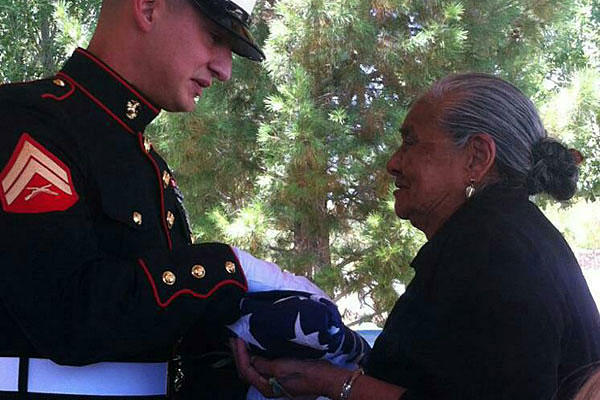There is irony and tragedy in the death in Mexico last year of 55-year-old U.S. Army veteran Manuel de Jesus Castano.
The irony is that Castano, a life-long legal U.S. resident deported for a past criminal conviction that had nothing to do with his Army service, was allowed into the U.S. for burial -- with full military honors -- at Fort Bliss, Texas. It was, as far as his family knew, the last and only veteran’s benefit he was entitled to.
Deported in 2011 from El Paso, Texas, where he was getting healthcare from the Department of Veterans Affairs for Lupus and Lou Gehrig’s disease, his conditioned worsened, according to his nephew. He died last June following a heart attack.
The tragedy is that Castano, his family and his supporters -- including other “banished veterans” forced to live outside the U.S. -- never knew that he was entitled to VA healthcare, including medications, regardless of his deported status.
VA spokeswoman Jo Schuda told Military.com that a deported veteran who already has VA healthcare can use the VA’s Foreign Medical Program, which is set up for veterans traveling or living overseas. Under the program, the VA assumes responsibility for necessary medical services related to a veteran’s service-connected medical conditions.
The same program can be used by vets submitted a claim and requiring evaluations and physicals, she said.
Even education benefits remain available.
“Veterans who are eligible for education benefits and have been deported may use their benefits to attend school outside of the U.S. as long as they enroll in a VA approved program,” she said. The VA’s Weams Institution Search website lets veterans find approved schools and universities both within the U.S. and overseas.
Deported veterans and their supporters contacted by Military.com for this story said they were not aware they could get benefits. Army veteran Hector Barajas, founder of a group devoted to ending the deportations and permitting those already sent from the U.S. to return, only recently submitted a disability claim just to see what might happen.
The application, sent in via registered mail, was accompanied by a claim from fellow deported veteran Fabian Rebolledo. Both men previously served with the 82nd Airborne at Fort Bragg, N.C. Rebolledo was receiving payments for a non-service connected disability until he was deported.
He said he continues to get medication because his mother, who is still in the U.S., buys it and mails it to him.
“I can’t see a doctor, though,” he told Military.com, like other veterans apparently unaware of the overseas program.
The program was set up to ensure that veterans who retire abroad or who are traveling can get their healthcare needs taken care of, according to the VA.
Victor Hinojosa, an Army veteran and U.S. citizen with family in Mexico, said he has asked VA officials in the past about help for the deported vets, only to be told there was nothing anyone could do. Hinojosa, an Army medic who served at Brook Army Medical Center during the Vietnam War, met Barajas a few years ago, when Barajas was working in a care facility for retirees, one of whom was Hinojosa’s father.
He isn’t surprised that the deported veterans were not told they could still apply for and use veterans’ benefits. Immigration and Customs Enforcement falls under the Department of Homeland Security, an agency that has a different mission and focus that the VA.
“Homeland security is running the show now. As far as Hector and Fabian told me, when they put [people awaiting deportation] in these detention camps in Arizona and elsewhere, they’re stripped of everything--– VA cards and everything else are just thrown in the trash somewhere,” Hinojosa said. “The VA doesn’t exist as far as [DHS] is concerned.”
Barajas currently works as a telemarketer in Mexico, where he has also turned his apartment into an information clearinghouse and support center for what he and others call “banished veterans.” He and some of the other veterans now living in Mexico try to help those newly arrived find places to live and work. There are at least six other veterans he knows there interested in applying for benefits.
Hinojosa said some vets he’s spoken with would be willing to stay on in Mexico if they could get their benefits, though most want at least the right to return to the U.S.
“I want these guys to get their [medical] treatment. At least give them that,” he said.
Thousands of veterans -- no one can say how many for sure -- have been deported for legal violations great and small since the mid-1990s.
That’s when Congress, responding to ever popular tough-on-crime and anti-immigrant pressure, passed legislation mandating the deportation of resident aliens convicted of crimes. The law provided no exceptions for how long the individual lived in the U.S. or whether he was a veteran or even active-duty servicemember.
As a result, veterans young and old have been put on buses and planes and sent to countries that many had only dim memories of -- if any.
In one of the most bizarre cases, a Persian Gulf War vet who had been adopted in Germany as an infant by an American military family was deported to Germany because he never acquired American citizenship. His service, honorable discharge, and the facts he was half African-American and did not speak a word of German meant nothing.
They are veterans of the most recent wars in Iraq and Afghanistan, and also of the Vietnam War. Two of these are Manuel and Valente Valenzuela, who have been fighting for three years to keep from being deported to Mexico.
“They want us to admit we're not American citizens, and we’re fighting to say we are,” Manuel, who served in Vietnam from 1971 to 1972. Though both men were born in Mexico, their mother was born in the U.S., but moved to and lived in Mexico for a time before returning home.
Manuel said the conviction that has put him on the deportation list is a drunk driving, disorderly and resisting arrest 25 years ago. He said his brother, who served with the Army’s 101st Airborne during the Tet Offensive in 1968, was convicted in a domestic violence case about a dozen years ago.
At a rally for President Obama last July, they managed to meet the commander-in-chief and briefly and quickly told him what they were facing.
“He said, ‘OK, I’ll check into it,’ ” Manuel recalled. Obama was turning to leave, but Manuel said he still had his hand in a shake. “I pulled it right back and I said, ‘Mr. President -- and I raised my hand with the banner -- and said, ‘Please take time to open this banner with me and look at it.’”
Obama directed the Secret Service to help Valenzuela open the banner, and then looked at it. Manuel said the president “shook his head” in sympathy, but says he never heard back from the White House.
Nevertheless, he said he had tears in his eyes after getting Obama to read the banner “because I had completed my mission.”
“I’m holding [Obama] responsible for all this now,” he said. “He’s our commander-in-chief. He is responsible to us, the people of the United States. That is something to be honored and reconciled -- to take care of veteran. Not to let Homeland Security or any other departments throw us away."
























